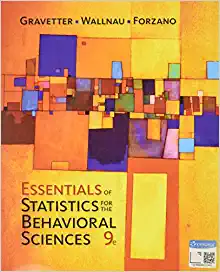When constructing or working with a grouped frequency distribution table, a common mistake is to calculate the
Question:
When constructing or working with a grouped frequency distribution table, a common mistake is to calculate the interval width by using the highest and lowest values that define each interval. For example, some students are tricked into thinking that an interval identified as 20–24 is only 4 points wide. To determine the correct interval width, you can:
a. Count the individual scores in the interval. For this example, the scores are 20, 21, 22, 23, and 24 for a total of 5 values. Thus, the interval width is 5 points.
b. Use the real limits to determine the real width of the interval. For example, an interval identified as 20–24 has a lower real limit of 19.5 and an upper real limit of 24.5 (halfway to the next score). Using the real limits, the interval width is 24.5 2 19.5 5 5 points 1.
Place the following set of n 5 20 scores in a frequency distribution table.
6 10 9 5 10 8 7 4 10 9 8 8 6 10 9 10 5 9 9 6
Step by Step Answer:

Essentials Of Statistics For The Behavioral Sciences
ISBN: 9781337098120
9th Edition
Authors: Frederick J Gravetter, Larry B. Wallnau, Lori Ann B. Forzano





